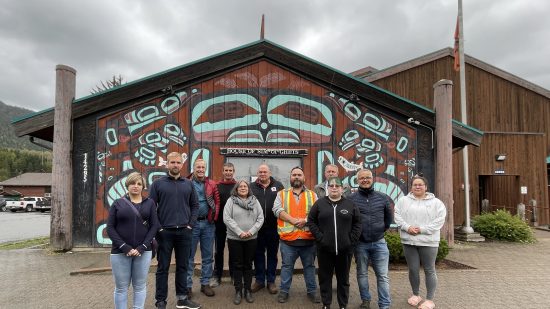‘Na Aksa Gyilak’yoo School in Terrace, B.C., received a boost to its educational initiatives with a $2,000 contribution from the Wood Pellet Association of Canada (WPAC), Skeena Bioenergy and the Prince Rupert Port Authority.
The contribution recognizes the power of partnerships that exists between the Kitsumkalum Economic Development Group of Companies, Skeena Bioenergy and the Port of Prince Rupert.
“The Kitsumkalum Peoples are a major part of the success of the entire wood pellet sector,” said Gordon Murray, executive director of the Wood Pellet Association of Canada. “By supporting the education goals of the community members, we are supporting everyone’s success.”
The announcement was made at a luncheon hosted by the Kitsumkalum Economic Development Corporation Group of Companies. It was the last stop in a series of events that started with the Association’s annual conference in Vancouver and then onto Prince Rupert and ending in Terrace with a tour of the Nation’s local forest operations and logistics park. Guests at the luncheon were from Italy, the Netherlands, the United States and Canada.
The ‘Na Aksa Gyilak’yoo School provides a holistic education program that enables students to reach their academic, cultural, and personal potential within a challenging, nurturing and caring environment. It supports all learners from a variety of communities and diverse cultures.
“The Kitsumkalum provide the critical link for the entire wood pellet sector,” explained Roger Keery, president of Skeena Bioenergy. “Without their Logistics Park, it would be impossible for Skeena Bioenergy to transport its wood pellets from the North by rail to the Port of Prince Rupert for transportation to domestic and global customers.”
According to Diane Collins, general manager of the Kitsumkalum Economic Development Group of Companies, the Kitsumkalum share the wood pellet sector’s commitment to sustainable forest management with goals to improve forest utilization by enhancing growth and ensuring the full utilization of the resource, all the while reducing environmental impacts.
“By supporting students to achieve their educational aspirations, the pellet sector is walking the talk when it comes to building relationships with Indigenous communities and investing in our future,” said Collins.
Over the past year, there has been robust growth in British Columbia’s wood pellet sector. Between November 2020 and October 2021, B.C. wood pellet exports increased by 30 per cent – with an additional 400,000 metric tonnes of pellets exported to Japan through the Port of Prince Rupert.
Currently more than 50 per cent of B.C.’s pellets (1.25 million metric tonnes in 2020) are exported through the Port of Prince Rupert. Over the next three years, the port expects a 60 per cent increase (2 million metric tonnes) of wood pellets through the Westview Terminal owned by Drax Group PLC.
This article was originally published by Canadian Biomass, a national media brand providing coverage of the emerging biomass, bioenergy and bio-products markets. See CanadianBiomassMagazine.ca for more information.

